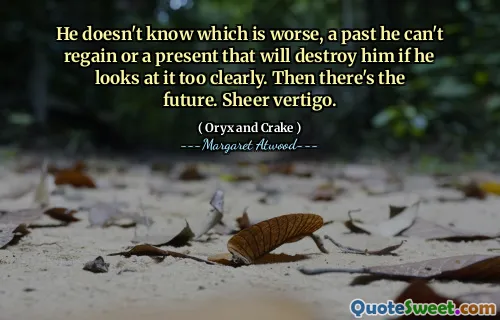How much needless despair has been caused by a series of biological mismatches, a misalignment of the hormones and pheromones? Resulting in the fact that the one you love so passionately won't or can't love you. As a species we're pathetic in that way: imperfectly monogamous. If we could only pair-bond for life, like gibbons, or else opt for total guilt-free promiscuity, there'd be no more sexual torment. Better plan – make it cyclical and also inevitable, as in the other mammals. You'd never want someone you couldn't have.
In "Oryx and Crake", Margaret Atwood reflects on the anguish stemming from biological mismatches in human relationships. These mismatches arise from misaligned hormones and pheromones, which often lead to unreciprocated love and emotional suffering. This predicament highlights humanity's flawed approach to monogamy, creating a cycle of longing for those who cannot or will not love back, suggesting that our species is inept when it comes to perfect partnerships.
Atwood proposes that if humans could either form lifelong pair bonds, similar to gibbons, or embrace guilt-free promiscuity, the emotional turmoil surrounding love and desire could be alleviated. She envisions a system where love and attraction operate cyclically and inevitably, akin to other mammals, where one would only desire the unattainable. Such a paradigm shift could eliminate the painful experience of yearning for someone outside one’s reach.






